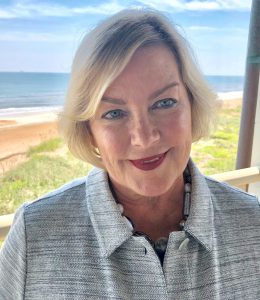As One of the First Women CEOs, This Serial Exec Has Experienced It All


Welcome to She Leads, a series digging into the good, the bad, and the ugly of being a woman in business. In each piece, we’ll chat with a different founder about her experiences, the issues women face in business, and how they’re powering through in the face of adversity.
Gwen Manto has spent most of her career as not just the only woman at the table, but the only woman employed across the top four levels of management. When she first walked into a boardroom, she did so in a skirt-suit and pantyhose — pants were still a non-option for women (which, again, was really just her). Years later in another boardroom (still all men), she went into labor and stayed in the meeting for the remaining hour and a half through sweat and labor pains.
“So it was…I would say it was a choice. It wasn’t forced on me,” she told From Day One. “I could have gotten up probably at any time. People were very accommodating to me when I was pregnant — I think, of course, because it was a novelty.”
All this and then some went down during her long string of executive roles at some of America’s most popular retailers. After serving as VP and SVP of Macy’s and Toys ‘R’ Us, respectively, Manto became CEO of Kids Footlocker, and with it, one of the first women to hold the title at a major cooperation. From there she went on to hold EVP and CMO positions at Sear’s, Stein Mart, Dick’s Sporting Goods, and Sports Authority.
After 45 years in retail, Manto’s business history can best be encapsulated by her favorite drink – the Cosmopolitan, a working woman’s cocktail of liberation and independence. The drink is one of the top offerings of her company mixallogy, which sells organic cocktail mixers made from "ugly fruit" to reduce waste. For the first time, she’s not just an executive, but a founder too.
We chatted with Manto to learn more about being a glass ceiling-breaker and how she’s bringing her experiences into her founder role:

When you became CEO of Kids Footlocker in 1998, women executives were a true rarity — practically non-existent (even today, women account for only 4.8% of CEOs at Fortune 500 companies). In that role and your subsequent executive positions, I’m sure you were the only woman in the room more often than not. What was that like for you?
Not only was it 1998 and women weren’t executives, but I was also in an exclusively male-dominated field. It was originally challenging because I would go through entire days without contact with any other women. My peers were male, the people that worked for me were male, and all of our suppliers — Nike, Adidas — were all male. It was interesting to build relationships as a woman in this scenario because you were different, and obviously people treated you differently.
I felt the need to fit in and be one of the guys. Even though I wasn’t really interested, I’d watch all the games and read Sports Illustrated cover to cover so I could stand my ground with them. This went on until our CEO at the time, my mentor, took me aside one day and said, “It’s great that you probably know more than they know about what happened in yesterday’s game, but the fact is it’s not really authentic for you. You’re here for a reason — because of your business acumen.” It was really a moment of realization for me, and it kind of released me from feeling like the foreign person in the room. So from then on, I stayed authentic to myself, and I think authenticity allowed me to build relationships, stay in the industry, and go on to similar roles.
I’m glad you had someone looking out for you who stepped in to say “you don’t have to do this,” because it sounds like you felt pressured to fit in socially. And do you feel like you had to work harder to prove yourself, too? Were you held to a different standard by your male peers?
I believe I was held to a male standard. When you ask, ‘Was it a higher standard?’ I think it was just a different standard. A great example is when I got to Dick’s, I was really looking to build relationships with our executive team and suggested having dinner with one of them. He said to me, ‘well I don’t think my wife would like that.’ And I really almost had to smile because I didn’t have any eyes on him or anything, but I think his wife would be sitting at home thinking ‘why would he go out with that new woman executive?’
You’re not typically invited to golf on Saturday with the guys because in most country clubs, women can’t tee off until 3 in the afternoon. These are givens, but there are other ways to build business relationships — by being a good partner in the business. I learned that through time.
What’s a memorable experience you had in business that would only happen to a women?
I can think of an example of something I did that a guy would never do. When I was CEO of Kids Footlocker, it was my dream job. For the first time, I could run the whole company, and I had a vision. But I worked in Manhattan, lived in New Jersey, and had three kids including a baby and a special needs child at home. I said I can’t go to work at 5:30 in the morning, get on the train and come back at 7 at night. I decided to find another job back down south where I could live closer to work and have a better balance. When I resigned they said, ‘Well, you know, there are no women here. We’ve given you the chance to do this job and blah blah blah. I don’t want to say you’re the token woman but you’re the only one and why would you do that?’
I think they were totally mystified why I would step off the track. Because at that point I think they considered me one of the guys, and I wasn’t acting like one of the guys. It’s not a typical thing a man would do. Typically they would get support from whoever was at home, so this was was hard for them to understand. I was worried this was going to derail me, but in the end it didn’t, and it gave me the confidence to move to the next thing.

So-
And as an aside, I did actually go into labor during a board meeting.
Oh really?
I sat there for an hour and a half in labor. And then I gave birth six hours later. So yeah, I think most guys haven’t done that either.
Why didn’t you say anything or excuse yourself from the meeting? Do you think you would have if it were a different work environment — one with more women?
Immediately upon seeing me perspiring, I suspect that if it had been a group of women, they would have said, ‘do you want a glass of water? Are you okay?’ At the time, everybody was in the moment, managing the business. And for me, I wanted to be there. So it was…I would say it was a choice. It wasn’t forced on me. I could have gotten up probably at any time. People were very accommodating to me when I was pregnant — I think, of course, because it was a novelty. Because there weren’t many women in business in general and I was 40 having a baby. So it was quite a thing. I think I was looked upon as ‘Wow, that’s a woman and she’s pregnant!’ And remember in those days, we didn’t even wear pants to work. We wore skirt-suits and pantyhose.
How have your experiences as an executive and a woman in a male-dominated field influenced your approach to running your new company?
When you start a company, it takes 100 percent of your business acumen to make it work. Being an entrepreneur calls upon all of my experience, all of my sense of people, all of my commitment, every day. I mean literally — whatever your experience is, you bring it there when you start a business. As a woman, I think I had a further advantage because we juggle a lot of different things that have different priorities.
For me, I’m a female entrepreneur, but I’m also a female entrepreneur who’s 64. I started this business 18 months ago when many people would be retiring. When I walk into a room to raise money, they’re looking at me saying ‘she’s not even the typical female entrepreneur.’ There are positives (‘She has a lot of experience. She’s run a lot of big businesses’) and negatives (‘Hmm, how long is her runway?’)
I’ve had a wonderful retail career of over 40 years and have created a lot of businesses. But nothing has been as rewarding as this because it addresses a need, and when I’m not solving problems, we’re just making people happy. Have a cocktail, shake it up. It’s fun.
This interview has been edited for length and clarity.
Sage Lazzaro is a NYC-based journalist covering diversity, inclusion, and social justice across tech, business, and politics. Her work has appeared in Refinery29, VICE, Medium, The New York Observer, and more. Follow her on Twitter here.
The From Day One Newsletter is a monthly roundup of articles, features, and editorials on innovative ways for companies to forge stronger relationships with their employees, customers, and communities.